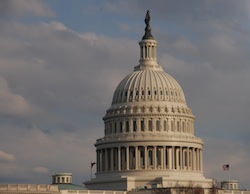 Leaders from several biofuel trade organizations are calling for the extension of some federal advanced biofuel tax credits. The Advanced Ethanol Council, Advanced Biofuels Association, Algae Biomass Organization, Biotechnology Industry Organization, Growth Energy, National Biodiesel Board, and Renewable Fuels Association have sent a letter to the Senate calling for the restoration of the Second Generation Biofuel Producer Tax Credit, the Special Depreciation Allowance for Second Generation Biofuel Plant Property, the Biodiesel and Renewable Diesel Fuels Credit, and the Alternative Fuel and Alternative Fuel Mixture Excise Tax Credit.
Leaders from several biofuel trade organizations are calling for the extension of some federal advanced biofuel tax credits. The Advanced Ethanol Council, Advanced Biofuels Association, Algae Biomass Organization, Biotechnology Industry Organization, Growth Energy, National Biodiesel Board, and Renewable Fuels Association have sent a letter to the Senate calling for the restoration of the Second Generation Biofuel Producer Tax Credit, the Special Depreciation Allowance for Second Generation Biofuel Plant Property, the Biodiesel and Renewable Diesel Fuels Credit, and the Alternative Fuel and Alternative Fuel Mixture Excise Tax Credit.
The letter reads, in part, “The advanced biofuels industry is at a critical stage of development. Despite a difficult financial market, we are now operating commercial plants across the country and continue to make progress on dozens of additional projects in the final stages of development. Advanced biofuel tax credits have allowed the biofuels industry to make great strides in reducing the cost of production and developing first-of-kind technologies to deploy the most innovative fuel in the world.
“As leaders in a critical innovation sector in the United States, we are well aware of the financial constraints facing this country. However, the United States’ global competitors are offering tax incentives for advanced biofuels and in fact are attracting construction of new facilities – and associated high skilled jobs. If Congress wants American companies to continue developing these homegrown technologies in the United States, it must extend these credits. Biofuel producers are also competing with incumbent fossil energy industries who continue to enjoy tax incentives on a permanent basis.”
The letter marks the latest effort by biodiesel and ethanol producers and their backers to get better federal government support for their green fuels. Late last year, the Environmental Protection Agency undercut the industries when it proposed drastic reductions in the amount of biodiesel and ethanol to be mixed into the Nation’s fuel supply. In addition, Washington also let these vital federal tax credits expire at the end of the year.

